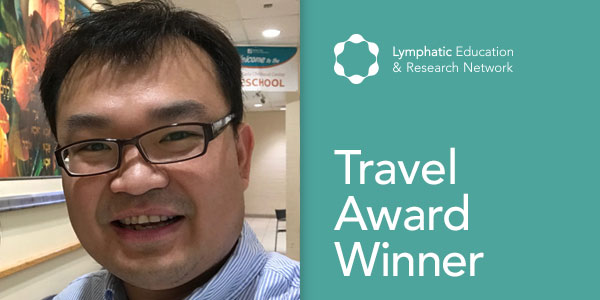Li-Hao “Paul” Huang, Ph.D., currently a post-doctoral scholar at Washington University School of Medicine, Pathology and Immunology Department, under the supervision of Dr. Gwen Randolph, received a Travel Award from LE&RN to attend the 2017 Lymphatics Forum in Chicago. We asked Paul to share his thoughts on that experience with us and to tell us a bit about his research and future plans.
1. What did you get out of the Forum? Why did you feel it was important to attend?
I really appreciate LE&RN and feel honored to receive the Travel Award. This was my second time attending the Lymphatics Forum and I believe the field of lymphatic biology is blooming and very energetic! There are more and more researchers from multiple disciplines joining this field to study lymphatics from different perspectives. I feel that it is so crucial for me to participate in this forum where I could discuss frontier research, ideas with many leading scientists, and even develop friendship or potential future collaboration all in one place. In addition, the staff from LE&RN put so much effort trying to obtain more resources and glue everyone together. I appreciate your great contribution and it was a fantastic experience to be part of this community.
2. What are your areas of interest in research?
I am keenly interested in understanding the process regarding how tissue-localized HDL particles egress from tissues and recirculate back to plasma through the lymphatic vasculature, and how this process can be regulated through immune cells under diseased conditions. This may answer a long unsolved question: why a pharmacological increase in plasma HDL levels fails to translate into clinical benefits?
3. What are your hopes and plans for your career and your research?
I will pursue a career as a principle investigator to study how the crosstalk between lipoproteins, immune cells, and lymphatic vasculature impacts metabolic and inflammatory diseases. I hope my studies provide potential therapies to tackle atherosclerosis through the improvement of lymphatic transport function for cholesterol clearance.
4. Why do you believe that, in general, lymphatic research is important? What might the field accomplish within the next few years?
Lymphatic vasculature exists in so many organs that it potentially cross talks with many fields of science. Although the field is still new to many people, growing evidence has shown that this cross talk impacts many diseases. I believe a better understanding in lymphatic biology will provide great opportunities to improve human health in various perspectives.
Programs such as LE&RN's Travel Awards program advance the scientific community's understanding of lymphedema and lymphatic diseases, allows for increased communication between researchers, and raises the profile of lymphatic research. These programs are only possible as a result of the generosity and dedication of LE&RN's corporate sponsors and Supporting Members. If you are committed to LE&RN's mission of fighting lymphedema and lymphatic disease through education, research, and advocacy, become a LE&RN Supporting Member today.

